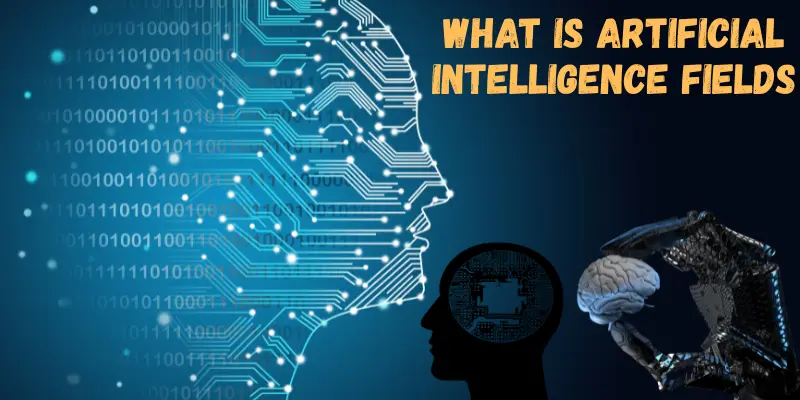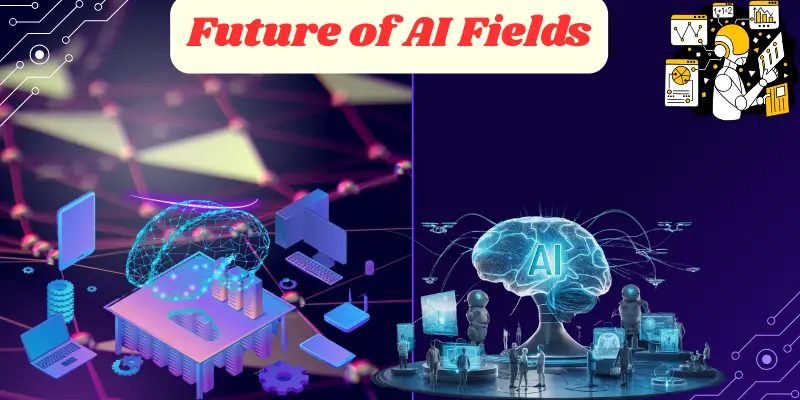Artificial Intelligence Fields – Key Concerns and Drawbacks
Published: 04/04/2025
Artificial Intelligence Fields, Artificial Intelligence (AI) is changing the way technology works. It helps machines think, learn, and make decisions like humans. Many industries use AI to solve problems faster and improve efficiency.
AI is divided into different fields, each with a special purpose. Some focus on teaching machines how to learn, while others help computers understand human language or recognize images. These AI fields are shaping the future and making life easier.
Table of Contents
What is Artificial Intelligence Fields?
Artificial Intelligence (AI) has different fields that help machines think and work like humans. These fields focus on teaching computers how to learn, understand language, see images, and make decisions.

Each AI field has a special job. Some fields help computers recognize voices, while others help robots move and perform tasks. These AI fields are used in schools, hospitals, businesses, and even mobile phones to make life easier.
Main AI Fields
Artificial Intelligence has different fields that help machines work smartly. Each field has a special role in making computers and robots more useful. Below are the main AI fields:
- Machine Learning (ML)
- This field helps computers learn from data and improve without human help. It is used in mobile apps, websites, and self-driving cars.
- Deep Learning
- It is a part of Machine Learning that trains computers to think like the human brain. It is used in speech recognition and face detection.
- Natural Language Processing (NLP)
- This field helps computers understand and respond to human language. It is used in voice assistants and chatbots.
- Computer Vision
- It allows computers to see and understand images or videos. It is used in medical scans, security cameras, and self-driving cars.
- Robotics
- This field helps in making robots that can perform tasks like humans. Robots are used in factories, hospitals, and space missions.
- Expert Systems
- These are AI programs that solve problems like human experts. They are used in medical diagnosis and financial decisions.
- Fuzzy Logic
- It helps AI make decisions even when the information is not clear. It is used in smart home devices and automatic cars.
- Neural Networks
- This field copies the way the human brain works. It is used in handwriting recognition, fraud detection, and gaming.
All these AI fields work together to make technology smarter and more useful in daily life.
Artificial Intelligence Fields Ki Importance
AI fields are important because they help make our daily lives easier and safer. Each field of AI solves different problems and makes things work more efficiently. Here’s why these AI fields matter:
- Improved Efficiency
- AI helps do tasks faster and without errors. For example, computers can process data much quicker than humans. This helps businesses work faster and more efficiently.
- Better Decision Making
- AI fields like Machine Learning help computers make smarter decisions. These decisions are based on data, so they are more accurate and reliable. For example, AI helps doctors make better medical decisions based on patient data.
- Automation
- AI fields like Robotics and Deep Learning help automate jobs. This makes things easier, like self-driving cars that drive themselves, or robots in factories that build products.
- Improved Safety
- AI fields like Computer Vision help keep us safe. For example, AI can detect problems in security cameras or medical scans, catching things that humans might miss.
- Solving Big Problems
- AI fields are used to solve big problems like climate change, energy use, and health issues. AI helps scientists predict problems and find solutions faster than ever before.
AI fields help make everything smarter, safer, and more efficient, making life better for everyone.
Future of AI Fields
The future of AI fields looks very exciting! As technology improves, AI will become even smarter and help solve bigger problems. Here’s how AI fields are expected to grow in the future:

- More Powerful Machines
- AI will become faster and better at learning. Machines will be able to do more complex tasks, like understanding emotions or solving problems that are too hard for humans.
- Smarter Robots
- Robots will be able to do more things like humans. They might help in more places, such as homes, schools, and hospitals. For example, robots could help take care of the elderly or clean our houses automatically.
- Better Health Care
- AI will play a huge role in medicine. In the future, doctors will use AI to predict diseases before they happen and suggest treatments that work best for each patient.
- Self-Driving Cars Everywhere
- AI fields like Computer Vision and Robotics will make self-driving cars more common. These cars will help people travel safely and without needing to drive.
- Personalized Learning
- AI will help make learning better. In the future, students might have AI tutors that help them learn at their own pace, making school easier and more fun.
In the future, AI will continue to grow, making the world smarter and helping people in ways we never imagined before.
Advantages and Disadvantages of Artificial Intelligence Fields
AI fields bring many benefits, but they also have some challenges.
Benefits of Artificial Intelligence Fields
AI fields make life easier by helping machines work faster, make better decisions, and solve problems in areas like healthcare, education, and business.
| Pros |
|---|
|
Drawbacks of Artificial Intelligence Fields
While AI brings many benefits, it also has some drawbacks. These include job loss, privacy concerns, and the risk of machines making mistakes or being misused.
| Cons |
|---|
|
Common FAQs about AI Fields
Here are some common questions people have about AI fields, along with simple answers that are easy to understand:
AI is the ability of machines to think, learn, and make decisions like humans. It helps computers do things like recognize speech, understand pictures, and solve problems.
AI learns by looking at a lot of data. For example, in Machine Learning, the AI looks at examples and learns from them. The more data it gets, the better it can make decisions.
The main fields of AI are:
- Machine Learning (ML): Machines learn from data.
- Deep Learning: A part of ML that helps machines think like humans.
- Natural Language Processing (NLP): Helps computers understand human language.
- Computer Vision: Helps computers see and understand images.
- Robotics: Makes robots that can do tasks like humans.
AI can help do many tasks, but it cannot replace humans. AI works best when it helps humans with hard or boring jobs, but humans still make important decisions.
AI is generally safe, but we must use it carefully. People make AI systems, so it’s important to make sure they are used for good purposes, like helping people and making life easier.
AI is used in many things, like:
- Voice assistants (Siri, Alexa)
- Self-driving cars
- Online shopping suggestions
- Healthcare to diagnose diseases
AI will change the way jobs are done, but it will not take all jobs. Many jobs will still need human creativity and thinking. However, new jobs in AI development and robotics will also be created.
Yes, AI can make mistakes. It learns from data, and if the data is wrong, the AI might make the wrong decision. That’s why humans need to check AI’s work.
Conclusion
AI fields are changing the world in many exciting ways. From making our daily lives easier to helping solve big problems, AI is a powerful tool. The main fields of AI, like Machine Learning, Robotics, and Natural Language Processing, are all working to make technology smarter and more helpful.
While AI brings many advantages, such as speed, efficiency, and safety, it also comes with challenges like job loss and privacy concerns. It’s important to use AI carefully and make sure it benefits everyone.
The future of AI looks bright, with even smarter machines, better healthcare, and safer ways to travel. As AI continues to grow, it will play a bigger role in shaping our lives for the better.

- Be Respectful
- Stay Relevant
- Stay Positive
- True Feedback
- Encourage Discussion
- Avoid Spamming
- No Fake News
- Don't Copy-Paste
- No Personal Attacks

- Be Respectful
- Stay Relevant
- Stay Positive
- True Feedback
- Encourage Discussion
- Avoid Spamming
- No Fake News
- Don't Copy-Paste
- No Personal Attacks





